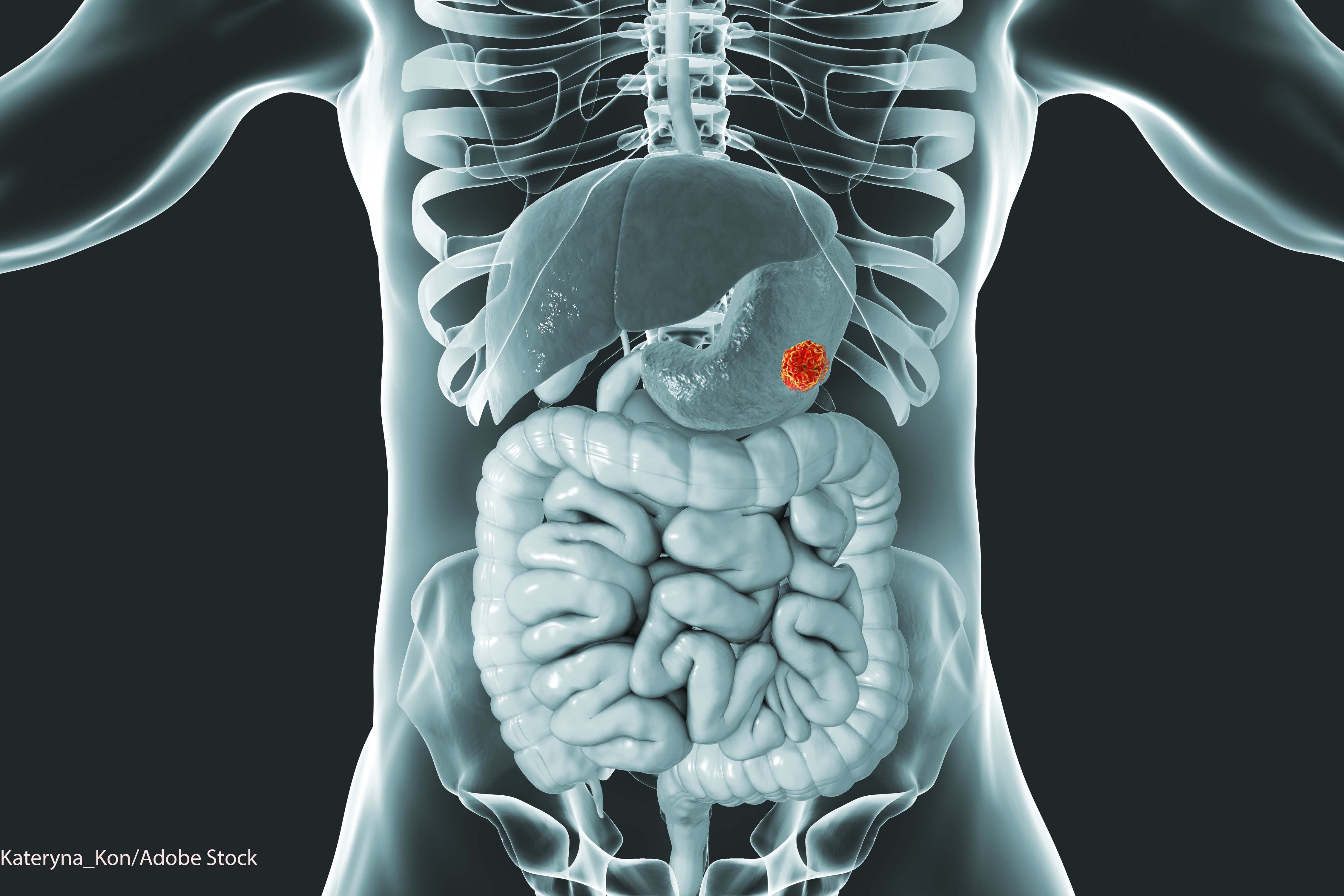Pembrolizumab/Chemo Improves Responses But Not EFS in Gastric/GEJ Cancer
Topline data from the phase 3 KEYNOTE-585 trial, evaluating pembrolizumab in gastric and gastroesophageal junction adenocarcinoma, show a better rate of complete response following the experimental regimen vs chemotherapy alone.
Pembrolizumab previously received an accelerated approval by the FDA in combination with trastuzumab and chemotherapy for the frontline treatment of HER2-positive gastric or gastroesophageal junction adenocarcinoma in May 2021.

The use of pembrolizumab (Keytruda) as a neoadjuvant and adjuvant therapy in combination with chemotherapy followed by pembrolizumab monotherapy improved complete response rates but failed to yield significant improvements in event-free survival (EFS) among patients with locally advanced, resectable, gastric or gastroesophageal junction (GEJ) adenocarcinoma, according to topline results from the phase 3 KEYNOTE-585 trial (NCT03221426) published in a press release from Merck.1
The pembrolizumab regimen produced a significant improvement in rate of pathologic complete response (pCR) compared with chemotherapy alone and thereby met one of the trial’s primary end points, according to a prespecified interim analysis from an independent data monitoring committee. The experimental therapy also improved EFS, another primary end point, but the benefit was not statistically significant. As such, investigators did not assess overall survival (OS) outcomes.
The safety profile mirrored findings from previous studies. Detailed findings will be presented at a future medical conference.
“While a statistically significant improvement in [pCR] was observed in this study, we are disappointed that the pembrolizumab regimen did not significantly improve [EFS], a result that underscores the challenges in treating locally advanced resectable gastric cancer,” Scot Ebbinghaus, MD, vice president of global clinical development at Merck Research Laboratories, said in the press release. “Innovative research in earlier stages of cancer is critical to help patients achieve better outcomes, and our efforts continue in earnest.”
The double-blind phase 3 KEYNOTE-585 trial included 1007 patients who were randomly assigned 1:1 to receive either pembrolizumab or a matched placebo.
The experimental regimen consisted of3 cycles of pembrolizumab, which was administered at a dose of 200 mg every 3 weeks in combination with cisplatin plus capecitabine– or 5-fluorouracil–based chemotherapy. This was followed by adjuvant treatment with 3 cycles of pembrolizumab at the same dose and frequency plus chemotherapy followed by single-agent pembrolizumab at a dose of 200 mg every 3 weeks for up to 11 cycles.
EFS was defined as the time from randomization to the first occurrence of either radiographic disease progression, recurrence, clinical progression, or death from any cause. pCR was defined as lacking any indications of cancer in tissue samples. OS was defined as the time from randomization to death, regardless of cause.
The trial will also assess disease-free survival and safety as secondary end points.
To be eligible for inclusion, patients needed an ECOG performance status of 0 or 1 within the last 3 days preceding their first dose of study treatment. Patients must also needed to have adequate organ function and a life expectancy of greater than 6 months to be included.
Exclusion criteria included any history of non-infectious pneumonitis requiring steroids, current pneumonitis, or any active infection requiring systemic therapy. Patients with a diagnosis of immunodeficiency, as well as those who received chronic systemic steroid therapy or any other immunosuppressive therapy in the 14 days prior to their first dose of study treatment were also excluded.
Pembrolizumab previously received an accelerated approval by the FDA in combination with trastuzumab (Herceptin) and chemotherapy for the frontline treatment of HER2-positive gastric or gastroesophageal junction adenocarcinoma in May 2021.2 The regulatory agency approved the regimen based on findings from the phase 3 KEYNOTE-811 trial (NCT03615326). Data shared at the time of the approval highlighted an overall response rate of 74% (95% CI, 66%-82%) among those treated with the pembrolizumab regimen vs 52% (95% CI, 43%-61%) in the placebo arm (P <.0001).
References
- Merck provides update on phase 3 KEYNOTE-585 trial in locally advanced resectable gastric and gastroesophageal junction (GEJ) adenocarcinoma. News release. Merck. June 20, 2023. Accessed June 20, 2023. https://bit.ly/44dBMad
- FDA grants accelerated approval to pembrolizumab for HER2-positive gastric cancer. News release. FDA. May 5, 2021. Accessed June 20, 2023. https://bit.ly/3pdyRPP